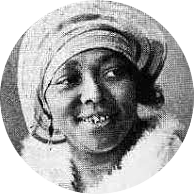 Lucille Bogan recorded some of the most memorable blues songs of the pre-World War II era, including some that were landmarks in blues and some that continue to sensationalize her reputation decades after her death. She was the first African-American singer to record blues at a session outside of New York or Chicago when she sang at sessions for OKeh Records set up in a warehouse in Atlanta in 1923, and several of her records were later covered or adapted by various artists who preceded her into the Blues Hall of Fame. But by far the predominant association now made with Bogan is the lewdness of two unexpurgated songs she recorded in 1935 that were not intended for public release.
Lucille Bogan recorded some of the most memorable blues songs of the pre-World War II era, including some that were landmarks in blues and some that continue to sensationalize her reputation decades after her death. She was the first African-American singer to record blues at a session outside of New York or Chicago when she sang at sessions for OKeh Records set up in a warehouse in Atlanta in 1923, and several of her records were later covered or adapted by various artists who preceded her into the Blues Hall of Fame. But by far the predominant association now made with Bogan is the lewdness of two unexpurgated songs she recorded in 1935 that were not intended for public release.
Sexual references were common in blues recording but the proprieties of the day called for them to be disguised in double entendre form. Bogan made a number of those, but presumably, for the entertainment of the recording staff and friends, she used explicit language in “Till the Cows Come Home” and an alternate take of “Shave ’Em Dry” that makes most hardcore rap lyrics seem tame. Though these were “private” recordings, bootleg pressings made their way into circulation and eventually were transferred to legitimate albums in more permissive modern times.
Bogan, however, had already long been a favorite among blues collectors and historians for the depth of her talent and recorded repertoire, and was a significant artist in the blues market of the 1920s and ‘30s. She lacked the name recognition of some of her contemporaries because most of her records were released under the pseudonym, Bessie Jackson.
Some of her songs embodied controversial themes including prostitution, lesbianism, and—since most were recorded during prohibition—drinking. Some veteran researchers doubt that she lived the rough street life she sometimes sang about, but her lyrics did reflect a familiarity with the underside of polite society. Bogan’s 1923-1935 recordings for OKeh, Paramount, Brunswick, Banner, Melotone, and other labels featured various notable accompanists including Will Ezell, Tampa Red, and Walter Roland. Among her influential records that survived via later artists were the first version of “Black Angel Blues” (later recorded by Tampa Red and Robert Nighthawk, and by B.B. King as “Sweet Little Angel”), “Sloppy Drunk Blues” (Leroy Carr, John Lee “Sonny Boy” Williamson, Jimmy Rogers, and others), and “Tricks Ain’t Walking No More” (Memphis Minnie).
Railroad references also cropped up in her songs, not surprisingly since her father, brother, and husband all worked for the railroad in Birmingham, Alabama, or Amory, Mississippi. Both towns have been purported as her birthplace (as Lucille or Lucile Anderson on April 1, 1897). Misinformation and speculation on her life is rampant on the internet, where Amory is most often cited. She and other relatives did live in Amory at times, but most census entries indicate Alabama, and Bogan herself gave Birmingham as the site on her Social Security application. She returned to the Birmingham area in between stays in Amory, Chicago, and elsewhere. Her brother Thomas “Big Music” Anderson was a musician, as was her son Nazareth Bogan Jr., whose group Bogan’s Birmingham Busters she reportedly managed. A few months before her death on August 10, 1948, she had moved to Los Angeles and kept a hand in the music business, as a song posthumously crediting her as writer appeared on a record on the L.A.-based Specialty label by bluesman Smokey Hogg
Inducted in 2022 to The Blues Foundation’s Blues Hall of Fame.
– Jim O’Neal, BluEsoterica.com
